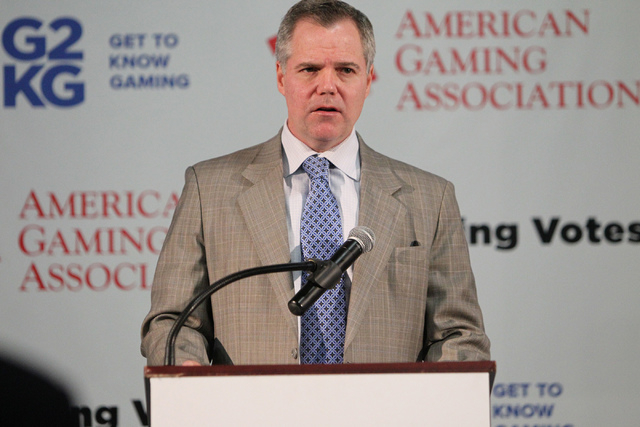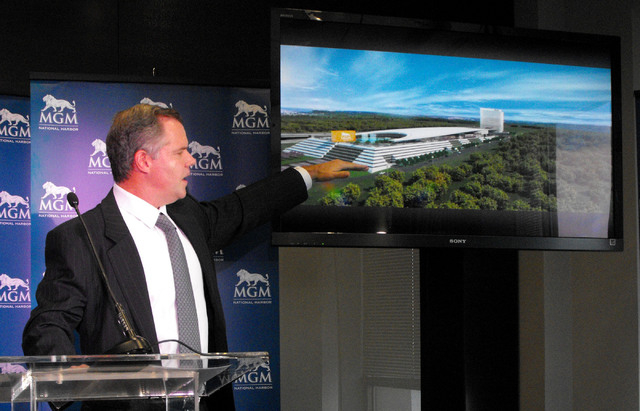Real estate investment trust concept could happen for MGM


By next year, at least three casino companies will have traveled the path into the real estate investment trust market.
Now, a fourth may join them on the trail.
Last month, MGM Resorts International CEO Jim Murren said his company had no plans to split some or all of its nearly two dozen U.S.-based casinos and resorts into a REIT.
But he didn’t dismiss the idea outright.
Here’s a portion of what Murren told Bank of America/Merrill Lynch gaming analyst Shawn Kelley during the company’s fourth-quarter conference call when he asked whether a REIT transaction made sense:
“We look at this all the time. We’re pitched by every bank that is out there in terms of whether or not we should do that,” Murren said. “There’s nothing definitive. There’s nothing to report, but we do look at these type of corporate transactions.”
The gaming industry has embraced REITs, which, by law, don’t pay federal income taxes. With real estate as their primary source of income, REITs are required to distribute at least 90 percent of their taxable earnings to shareholders.
Murren said the idea of gaming industry REITs was not new. Several companies started down the path before 2008. But the recession hit, and the concepts were scuttled.
In 2013, Penn National Gaming split off 21 of its 29 casinos and racetracks — including M Resort — into Gaming and Leisure Properties, a publicly traded REIT. The properties are leased back to Penn through a management contract.
In 2014, Pinnacle Entertainment announced plans to split off the company’s 15 casinos in eight states into a REIT. Also, Boyd Gaming Corp. said it spent $3 million in 2014 to investigate a potential REIT split.
Caesars Entertainment Corp., through its voluntary Chapter 11 bankruptcy plan, is asking the court to approve converting its largest operating division into a publicly traded REIT.
Deutsche Bank gaming analyst Andrew Zarnett called REITs the industry’s “latest and greatest” idea.
But, he didn’t think it made sense for MGM Resorts.
“Given the tax basis, something management acknowledged, as well as the financial leverage on the domestic balance sheet, we see the likelihood of this as rather low,” Zarnett said.
Union Gaming Group analyst Chris Jones told investors he struggles “with the functional application of a REIT structure in Las Vegas” but he did see the opportunity if MGM decided to convert its regional properties into a REIT.
Murren, on the conference call, said there was merit to a REIT because he believes some of the company’s properties are undervalued. Because MGM Resorts is a public company, the executive team must explore all opportunities.
“The amount of business we get between our regional properties and our core properties here in Las Vegas is growing rapidly,” Murren said. “We do know that there’s value in a portfolio of properties. Whether we have to own them all is the question that you’re asking. We don’t have the answers to that at this point in time.”
MGM Resorts is on an upswing. Cash flow from its U.S. properties in 2014 was the company’s best in six years. Revenue per available room at its Strip resorts, including Bellagio, MGM Grand, Mandalay Bay and The Mirage, increased 7 percent in the fourth quarter.
Nothing has changed in the first two months of 2015. Hotel bookings and convention bookings are up and Murren gleefully predicted revenue at the MGM Grand during the May 2 championship fight between Manny Pacquiao and Floyd Mayweather Jr. at the hotel’s Grand Garden Arena “will break every record.”
MGM Resorts has long-term debt of $12.9 billion that analysts classify as manageable. The company is building new resorts in Springfield, Mass., National Harbor, Md., and Macau, along with a $350 million, 20,000-seat sports arena on the Strip.
And, despite Macau’s recent troubles, MGM Resorts still receives healthy dividends through its 51 percent ownership of Hong Kong Stock Exchange-traded MGM China that the company uses to fund U.S. expansion. A special dividend of $204 million is expected to arrive this month.
The company has come a long way from a near-death experience in 2009, brought on by recession-related cost overruns from the massive CityCenter.
“MGM’s balance sheet is in far better shape today, and we remain constructive on its pipeline,” Credit-Suisse gaming analyst Joel Simkins said.
Macquarie Securities gaming analyst Chad Beynon said MGM is on track “to generate industry-leading (cash flow) growth on the back of healthy Las Vegas fundamentals.”
So why would the company consider a REIT transaction?
Caesars said placing its Caesars Entertainment Operating Co. into a REIT is key to the restructuring, which will reduce the operating division’s debt from $18.4 billion to $8.6 billion.
The unit would become two companies — one owning the real estate and one managing the properties. The division controls Caesars Palace, Caesars Atlantic City, Harrah’s Reno and more than a dozen regional properties. It’s unclear which resorts would be placed in the REIT.
Murren acknowledged MGM Resorts would have some “challenges … from a tax perspective” if the company went the REIT route. For now, it’s just another idea among the many MGM routinely considers that might create additional stockholder value.
“Those who have followed us a lot know that we’re an active corporate finance organization,” Murren said. “We’ve bought properties (and) we’ve sold properties. We’ve done just about everything that’s been done out there.”
Howard Stutz’s Inside Gaming column appears Wednesdays and Sundays. He can be reached at hstutz@reviewjournal.com or 702-477-3871. Find him on Twitter: @howardstutz.












